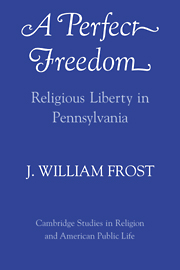Book contents
- Frontmatter
- Contents
- Acknowledgments
- Preface to This Paperback Reissue
- Introduction: The Pennsylvania Traditions of Religious Liberty
- I The Creation of Religious Liberty in Early Pennsylvania
- II Pacifism and Religious Liberty
- III The Clergy and Religious Liberty
- IV Religious Liberty in the Revolution
- V Religious Liberty and the Republic
- VI Politicians Debate Religious Liberty
- VII The Churches and Religious Liberty
- VIII The Legal Implications of Religious Liberty
- IX Religious Liberty and the Catholic and Jewish Minorities
- Epilogue: The Dismantling
- Notes
- Bibliography
- Index
Epilogue: The Dismantling
- Frontmatter
- Contents
- Acknowledgments
- Preface to This Paperback Reissue
- Introduction: The Pennsylvania Traditions of Religious Liberty
- I The Creation of Religious Liberty in Early Pennsylvania
- II Pacifism and Religious Liberty
- III The Clergy and Religious Liberty
- IV Religious Liberty in the Revolution
- V Religious Liberty and the Republic
- VI Politicians Debate Religious Liberty
- VII The Churches and Religious Liberty
- VIII The Legal Implications of Religious Liberty
- IX Religious Liberty and the Catholic and Jewish Minorities
- Epilogue: The Dismantling
- Notes
- Bibliography
- Index
Summary
The major features of Pennsylvania's pre-Civil War understanding of religious liberty endured until the mid-twentieth century. In 1894 the Pennsylvania supreme court upheld the practice of mandatory reading without additional comment of a passage from the Bible in public schools. There was not even a court case on the recitation of the Lord's Prayer that often followed the Bible reading. In 1882 the court declared that a person's testimony in a trial did not depend upon the orthodoxy of his belief, provided that he thought that God punished falsehoods. In 1910 the court affirmed again that the Commonwealth's common-law tradition included a nondenominational Christianity.
The Sunday laws withstood serious challenge until World War II. In 1893 newspapers could not be sold on Sunday. The sesquicentennial fair could not be open on the Sabbath. In the 1920s Pennsylvania continued to prohibit hunting, fishing, and sports on Sunday. In 1927 the court applied the 1794 no-sports-on-Sunday provisions against professional baseball teams. There were exemptions, some granted by the court under the definitions allowed in the 1794 act as works of necessity and transportation and others by acts of the legislature. After 1926 the sale of gasoline was deemed a necessity; utilities could repair machinery and people could engage in ‘wholesome recreation.‘
- Type
- Chapter
- Information
- A Perfect FreedomReligious Liberty in Pennsylvania, pp. 159 - 165Publisher: Cambridge University PressPrint publication year: 1990
- 1
- Cited by



